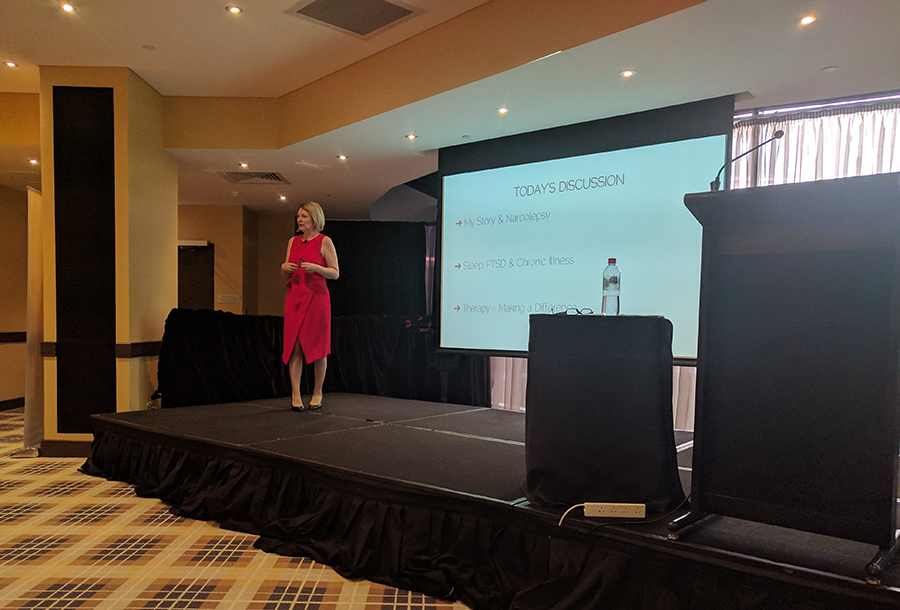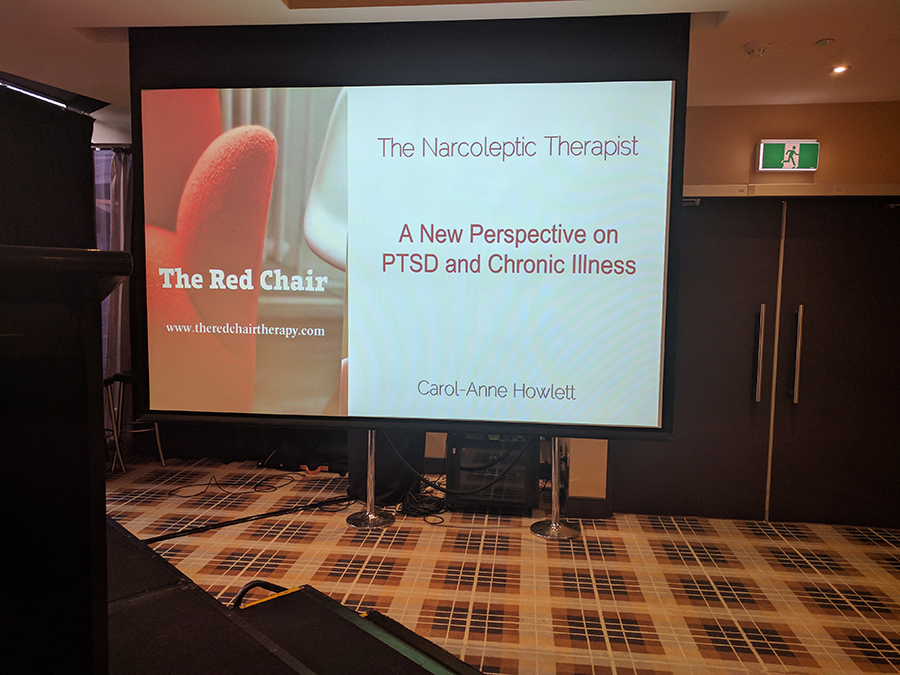The Sleepy 'Little Miss Fix It'
By Carol-Anne Howlett
At the ripe old age of 42 and the kids almost grown, I found myself looking for more meaning to my life. I knew it had to be the ‘helping’ stuff but had no idea what that meant. I stumbled on psychotherapy. I procrastinated ashamedly, until I made a knee jerk reaction and signed up.
“I was diagnosed with Narcolepsy/Cataplexy, a noted sleep disability at the age of 51. Simply put, the sleep part of my brain stopped working.”
However, I set myself certain conditions from the off: I would NEVER work with those who were dying, had a chronic or terminal illness or experienced domestic violence. As I explored what my classmates perceived as my impatience with this area of therapy, it took me many years to realise the cause. I eventually concluded that I was always ‘little miss fix it’ and I knew that I could not ‘fix’ any of these areas, therefore, what was the point for me?
Of course, I had oodles of empathy and understood that these clients needed support and grief work but still, I remained resolved. Until……. well last year really.
I was diagnosed with Narcolepsy/Cataplexy, a noted sleep disability at the age of 51. Simply put, the sleep part of my brain stopped working. My stupid, spongy mass couldn’t work out when I should sleep or stay awake. Notable symptoms being excessive daytime sleepiness, severe memory loss, hallucinations, (where I would sit up and shake hands with people!), sleep paralysis and sleep eating. The latter set the family on a different path…humor! I would stick my head in the fridge (asleep at night) and eat as much food as I could. I would eat Dave’s chocolate (my long-suffering husband) and would be adamant that I hadn’t touched it, regardless of the trailing foil wrappers from kitchen to bedroom. One morning, I even woke up with a mouthful of half eaten peanuts with the remnants all over the bedcovers. I thought ‘what the …?’ Dave wasn’t impressed and he started hiding all the ‘goodies’. I hated him for that!
I was forced to stop work, throwing us into financial strife and mentally flew into a total ‘flight or fight’ response. I was shocked at how ashamed I felt of myself. I wanted to scream at people. Just because I couldn’t remember simple words or recent events, didn’t mean I was stupid and felt I had to remind people that I did have a degree and a master’s! I hated my body, it let me down. At one point, I considered cutting myself (but didn’t), I would say that I wished I had cancer instead, at least I would feel there was treatment, or it would end, either way.
Being the typical Irish matriarch of the family, I was humiliated that my grown children suddenly became my carers (albeit only for a few months thank God), Dave, God love him, had to step up, this was hard for him for he too was at a total loss. For example, it would take me a good couple of hours to cook the evening meal where in the past I could whip anything up in half an hour. Multi-tasking? Forget it! I would forget to dress myself, forget to shower and forget to take my new medications or would take three days’ worth not realising I had already taken them, (despite using the weekly boxes). But….I had good days and bad. The bad, included a very strong belief that the family would have a better quality of life without me and they would be released from this lifelong burden. Thankfully, as a therapist, I understood what was happening to me and reached out to the right people.
Another shock that just broke my heart was that some of my closest friends distanced themselves from me. Those that always had my unconditional support when they were facing life’s challenges, they just did not know how to relate to me. I felt so let down and was in a state of shock. This fed my self-disgust. In hindsight, this was a good thing, for what came out of the woodwork, were those that were just always ‘there’ in the background. These incredible people have been my life support. Our friendships have grown and deepened and I saw their true beauty, something I had completely missed before.
Oddly, I was never symptomatic in therapy, I was still a good therapist. Relief! Yes, I would be tired and would have to make sure the following day was a rest day, but I was so thankful that I could still follow my passion.
As the medications started taking effect, albeit slowly, I joined a Facebook support page for Narcoleptics. I had run face-to-face support groups many times, mainly the addicted population in hospitals and with outpatients. However, I never thought that I would join a support group; I had spent 2.5yrs as a participant in group as part of my training and I had ‘done my time’. But I was desperate.
“ Looking back now, this was the turning point for me. I was so surprised that the 600 group members all had the same symptoms, especially the ones that didn’t exist in the literature. We laugh at each other’s ‘moments’ and pat each other on the back when we post that ‘I’ve had a shower today!’ ”
Looking back now, this was the turning point for me. I was so surprised that the 600 group members all had the same symptoms, especially the ones that didn’t exist in the literature. We laugh at each other’s ‘moments’ and pat each other on the back when we post that ‘I’ve had a shower today!’ A strange insurmountable task for most of us (don’t worry, I don’t smell!). The group also helped me realise that I was grieving. Grieving for the old me and trying to work out the new. A certain existential crisis for us all, where some had successfully resolved and others like myself were still trying to work it out; which I am, working out new ways to do old things. It was and still is the best experience.
Some members of the group contacted me for therapy. I was shocked, was I not too damaged? They knew me, warts ‘n all’…but they still expressed a need for a therapist that just ‘got it’. They were sick of trying to explain symptoms that no one understood or had any idea of the real impact it had on their lives.
It has started to become a bit of a ‘niche’ area for me, some travel interstate for their session. I, in turn, well… I have learnt so much from my clients and truly began to understand support and grief. I now understand dying and have a totally different perspective on this. I realise that I can offer more than the ‘fix it’ answers, so much more. I feel the true depth of difference a support group can offer, I learnt that just to ‘be’ with a client is truely good enough.
I discovered that many of life’s challenges such as Cancer and Disability have many commonalities as well as those that are specific to the individual. Today, I confidently see clients with terminal or chronic illness and even run the occasional support group. My clients have taught me so much and I find them inspirational.
Finally, my relationship with my mother and sister in Ireland deepened to a level I never knew was possible as I shared my vulnerability (I just don’t do vulnerability!). I can’t imagine living without this experience and feel very lucky.
“Narcolepsy became a gift and I am at peace.”
Carol-Anne has a Master of Counselling and Applied Psychotherapy along with Bachelor of Counselling & Human Change. She is the founder of ‘The Red Chair Therapy’ in Sydney Australia.
Recommended Reading:
Man’s Search for Meaning – Victor Frankl
Staring at the Sun – Erving Yalom
Concepts of Self – Anthony Elliot
The Examined Life – Stephen Grosz
On-line
Brene Brown on Empathy https://youtu.be/1Evwgu369Jw













